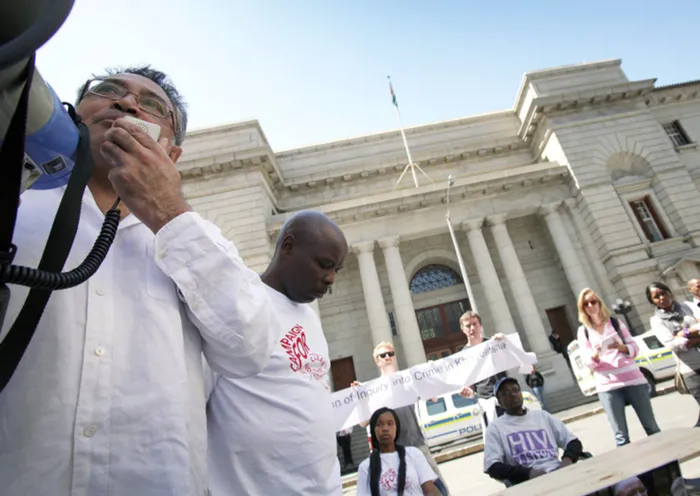Reports on slack cops not full story

Cape Town - 121112 - Zackie Achmat and Vuyani Mngqete, 47, from the SJC speak at the congregation. The white banner reads: Commission of Inquiry into Crime in Khayelitsha. Members of the Social Justice Coalition gathered outside High Court for the appearence of National Police Minister Nathi Mthethwa against the Commission of Inquiry into the Khayelitsha Police Department, which has had an alarming number of complaints, misdemeanours and abuse charges brought against it. REPORTER: LYNETTE JOHNS. PICTURE: THOMAS HOLDER Cape Town - 121112 - Zackie Achmat and Vuyani Mngqete, 47, from the SJC speak at the congregation. The white banner reads: Commission of Inquiry into Crime in Khayelitsha. Members of the Social Justice Coalition gathered outside High Court for the appearence of National Police Minister Nathi Mthethwa against the Commission of Inquiry into the Khayelitsha Police Department, which has had an alarming number of complaints, misdemeanours and abuse charges brought against it. REPORTER: LYNETTE JOHNS. PICTURE: THOMAS HOLDER
Cape Town - Khayelitsha residents often have to go to great lengths to get their cases investigated, according to the Social Justice Coalition (SJC).
On Monday, legal teams representing Police Minister Nathi Mthethwa and Premier Helen Zille met in chambers to postpone an urgent interdict application hearing. The matter will know be heard on December 13.
Mthethwa is taking Zille to court to get her to recall subpoenas sent to high-ranking policemen and to get a court order stopping the commission of inquiry into the Khayelitsha police.
The dire state of the Khayelitsha police was laid bare in an explosive report attached to the court papers. There were also hints of the difficulties people have had in getting their cases properly investigated.
This was confirmed by the number of misconduct cases against police officers in the area.
Last year, there were 701 cases of misconduct relating to the ways in which crimes were investigated, including failure to send charged suspects to court and failure to register dockets.
Joel Bregman, of the SJC, said although the report reflected that a number of the cases they had brought to the task team’s attention had been dealt with, it did not truly convey the effort it had taken to get the police to do their work.
Based on case studies, it appears that complainants and witnesses were often not kept informed of the status of cases.
According to the report, the killers of Treatment Action Campaign (TAC) activist Nandipha Makeke, 18, were found guilty and sentenced to jail, but Bregman says what happened in between her killing and the sentencing is of concern.
Makeke was raped and murdered in December 2005. By February 26, 2008, there had been more than 20 court appearances and witnesses had been intimidated. The TAC, at its own expense, arranged a safe house for three of its members.
A seven-year-old boy, allegedly raped by his neighbour in April 2010, was also let down by the system.
His alleged attacker was released on bail although his mother had been given the assurance that the State would oppose bail. The accused threatened the family, but the police were at first reluctant to open a case.
Bregman said that when they did, they put it under the existing case - meaning that a warrant of arrest could not be issued. At one point police told the family that they should try to locate the accused and then call the police to come arrest him.
At a hearing in September 2010, it was announced that the docket had been lost. It later emerged someone had forgotten to take it to court. The matter did not go to court as the boy was in no position to give evidence. But the assurance was given that the case would be reassessed in five years.
lynnette.johns@inl.co.za
Cape Argus